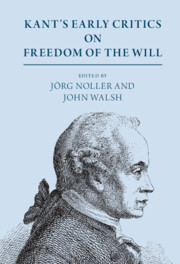Book contents
- Kant’s Early Critics on Freedom of the Will
- Kant’s Early Critics on Freedom of the Will
- Copyright page
- Contents
- Acknowledgements
- Note on the Edition and Translation
- Chronology of the Translated Texts and Kant’s Major Works
- Abbreviations
- Historical and Systematic Introduction
- I Freedom and Determinism
- II Freedom and Imputability
- III Freedom and Consciousness
- Ludwig Heinrich von Jakob, “On Freedom,” Berlin, 1788
- Karl Heinrich Heydenreich, “On Moral Freedom,” in Betrachtungen über die Philosophie der natürlichen Religion, Volume ii, Leipzig, 1791, 56–69
- Johann Heinrich Abicht, “On the Freedom of the Will,” Neues Philosophisches Magazin 1, Part I(III), (Leipzig, 1789), 64–85
- IV Freedom and Skepticism
- V Freedom and Choice
- Appendix: Biographical Sketches
- Glossary
- Notes
- Bibliography
- Index of Persons
- Index of Subjects
Johann Heinrich Abicht, “On the Freedom of the Will,” Neues Philosophisches Magazin 1, Part I(III), (Leipzig, 1789), 64–85
from III - Freedom and Consciousness
Published online by Cambridge University Press: 24 March 2022
- Kant’s Early Critics on Freedom of the Will
- Kant’s Early Critics on Freedom of the Will
- Copyright page
- Contents
- Acknowledgements
- Note on the Edition and Translation
- Chronology of the Translated Texts and Kant’s Major Works
- Abbreviations
- Historical and Systematic Introduction
- I Freedom and Determinism
- II Freedom and Imputability
- III Freedom and Consciousness
- Ludwig Heinrich von Jakob, “On Freedom,” Berlin, 1788
- Karl Heinrich Heydenreich, “On Moral Freedom,” in Betrachtungen über die Philosophie der natürlichen Religion, Volume ii, Leipzig, 1791, 56–69
- Johann Heinrich Abicht, “On the Freedom of the Will,” Neues Philosophisches Magazin 1, Part I(III), (Leipzig, 1789), 64–85
- IV Freedom and Skepticism
- V Freedom and Choice
- Appendix: Biographical Sketches
- Glossary
- Notes
- Bibliography
- Index of Persons
- Index of Subjects
Summary
In his “On the Freedom of the Will” (1789), Johann Heinrich Abicht rejects the proposition that freedom immediately reveals itself to us through consciousness or some special feeling. Were that the case, Abicht maintains, then freedom would be knowable, which is impossible given that it is transcendental and inaccessible to our understanding. Nevertheless, on Abicht’s view, consciousness still plays a role in demonstrating that our will is free. He grants that we are conscious of certain internal volitional appearances, e.g. approval, decision, inclination, desire, etc. In order to demonstrate the concept of freedom, which Abicht understands as the capacity to be the self-contained ground of volition, we must prove that the ultimate grounds of these appearances are internal to the I and therefore not subject to external determination.
- Type
- Chapter
- Information
- Kant's Early Critics on Freedom of the Will , pp. 135 - 144Publisher: Cambridge University PressPrint publication year: 2022

